01.VALUE CREATION
MC's Sustainable Value Creation Story
02.SUSTAINABILITY
Management Platform Supporting Value Creation
- Sustainability Promotion Framework
- Risk Management
-
Stakeholder Engagement
-
Corporate Governance
03.DETAILED FACTS
Reference Information
- Members of the Board and Audit & Supervisory Board Members
- Executive Officers
- Organizational Structure
- Business Groups at a Glance
- Global Network (Countries and Regions)
- Balance of Risk Money Outstanding in 12 Countries
- Financial Highlights
- ESG Data
- Corporate Information
- Shareholder Information
-
Description of Business Activities: Business Groups

MC's EX Initiatives
Our vision for EX
The global shift toward a low-carbon/decarbonized society is accelerating, as evidenced in 2021 by developments such as the discussions during the Leaders Summit on Climate in April and the G7 summit in June. In Japan, which has limited natural resources, MC has long fulfilled a societal mission to provide a stable supply of energy through its deep involvement as a supplier of LNG, metallurgical coal and other resources. As such, we need to adapt to this transition with a heightened sense of responsibility and determination. We will evolve our business portfolio by taking on the challenge of energy system innovation, striving to both meet environmental challenges and fulfill our societal mission of providing a stable supply of energy. By actively pursuing energy transformation (EX) initiatives, we will work toward the ambitious goal of achieving a decarbonized society. In 2020, MC established the Energy Committee, which consists of three Group CEOs responsible for its energy and power-related businesses—the Power Solution Group, the Natural Gas Group and the Petroleum & Chemicals Solution Group—together with the Corporate Strategy & Planning Department.

 Energy Committee Initiatives,
Energy Committee Initiatives,
Messages from
the Three Group CEOs
Background and Role of the Energy Committee
The transition to a decarbonized society is anticipated to move forward with a focus on intensive electrification and emissions reductions in the energy and power generation sector.
Adapting and developing initiatives in response to this global shift has become a common priority across all industries. In May 2020, MC established the Energy Committee as a forum for discussing medium- to long-term portfolio strategies and optimal approaches with a focus on the energy and power generation sector. Topics discussed by the committee, which is led by the three Group CEOs responsible for MC's energy and power-related businesses, together with the Corporate Strategy & Planning Department, include the alignment of perspectives on the business environment and the development of business strategies based on these perspectives. The results of these deliberations are reported to MC executive management members.
Energy Committee Initiatives
The theme selected for the Energy Committee's deliberations is the anticipated paradigm shift in the energy and power generation sector amid the transition to a carbon-neutral society. Since its establishment, the committee has worked to verify hypotheses relating to this theme, examined portfolio and business strategies, and engaged in intensive dialogue and debate about the order of priorities for implementing measures. In the fiscal year ended March 31, 2021, the committee held meetings approximately twice a month.
Key verification themes
- Synergies between the LNG business and power generation business
- Changes in power infrastructure due to renewable energy being adopted as a main power source
- MC's unique approach to power retailing
- Synergies through the integrated promotion of power generation and power retailing
-
Next-generation energy initiatives
In September 2020, the Next-Generation Energy Subcommittee was established with members from six related groups
MC informed the Outside Directors and Outside Audit & Supervisory Board Members in July 2020, and held a joint meeting with the Sustainability & CSR Committee in December. Our policy is to continue discussions at this committee while further strengthening cooperation with relevant parties. MC will present its unique optimal solution within the fiscal year ending March 31, 2022 targeting a carbon-neutral society by 2050.
Developing Renewable Energy
as a Main Power Source
Group CEO, Power Solution Group Katsuya Nakanishi
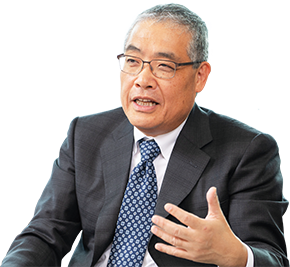
Renewable Energy Generation Business and Next-Generation Energy System Initiatives
Toward the realization of a decarbonized society, MC aims to double its renewable power generation capacity from 3.3 GW in the fiscal year ended March 31, 2020 to 6.6 GW by the fiscal year ending March 31, 2031. This shift toward using renewable energy as a primary power source is accelerating efforts to introduce various types of renewable power systems, from large-capacity offshore wind farms to small, decentralized solar power facilities. Renewable energy is the ultimate zero-cost, distributed power supply. We believe that by making full use of these characteristics, we can achieve progress toward the shift to local production for local consumption, as well as the development of community-based power infrastructure. However, it will also be necessary to upgrade our function to balance supply and demand to compensate for the intermittent nature of renewable energy. In addition to providing power adjustment based on conventional gas-fired power generation, MC is also taking on the challenge of creating new systems for the supply and demand of power that make use of digital technology and artificial intelligence in power generation forecasting, virtual power plant (VPP) technologies, as well as utilization of battery storage and electric vehicles (EV).
100% Non-Fossil Fuel Ratio
Looking ahead to 2050, we will actively promote the greening of our power generation portfolio by adopting renewable energy supplies and zero-emission thermal power generation. Our aim is to achieve a 100% non-fossil fuel ratio in our power generation business.
Natural Gas: A Pragmatic Solution
Group CEO, Natural Gas Group Jun Nishizawa
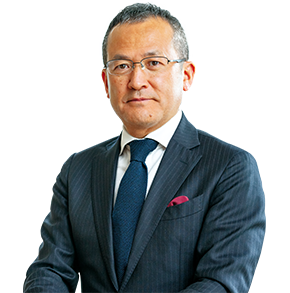
Switching from Coal and Oil to Natural Gas
With the growing use of renewable energy as part of decarbonization efforts, balancing supply and demand with gas-fired power generation will become increasingly important. The MC Group is a leading supplier of LNG, which has the lowest greenhouse gas (GHG) emissions of any fossil fuel during combustion. LNG will play a vital transitional role as the power sector decarbonizes.
In addition, shifting from coal and oil to natural gas as an energy source would be an effective and pragmatic solution to the issue of growing energy needs, particularly in Asia. This approach would balance economic growth with the need to address environmental concerns in emerging economies, where air pollution, among others, is a major problem.
Natural gas is also used as a raw material in the production of blue hydrogen and blue ammonia, which are both seen as next-generation energy sources, so we are confident that natural gas will continue to be a valuable energy resource in the future.
Reducing LNG Emissions
While LNG emits less GHG than any other fossil fuel when combusted, further improvements in its environmental performance will be needed amid the shift toward decarbonization. In addition to reducing CO2 emissions across our LNG supply chain, we will also need to make further mitigation actions toward achieving net-zero emissions through carbon management businesses including carbon capture and utilization and storage (CCUS).
Building Supply Chains to Meet
the Needs of Future Generations
Group CEO, Petroleum &
Chemicals Solution Group Osamu Takeuchi
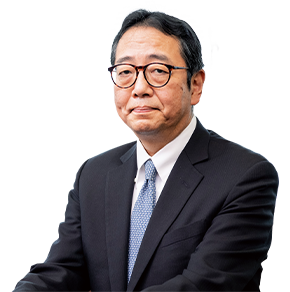
Decarbonizing Energy
Realizing the vision of a hydrogen-based society will require the decarbonization of energy itself. We are carrying out wide-ranging analyses and studies about various options, including green hydrogen produced with renewable energy. Still, for the time being, we believe that blue hydrogen combined with carbon capture and storage (CCS) is the most promising candidate.
Building a Blue Ammonia Value Chain
MC has long regarded ammonia as a promising hydrogen carrier and is developing an ammonia business. We also possess industrial knowledge and global networks in such areas as natural gas and CCUS. MC aims to build a competitive blue ammonia value chain as a step toward decarbonizing industry as a whole.
In addition to developing zero-emission thermal power generation that is fueled by hydrogen and ammonia, we believe it is our mission to expand the utilization of these technologies into new fields, such as mobility and raw materials, through the development of the necessary societal systems, including infrastructure.
Initiatives from three perspectives
MC will present its unique optimal solution within the fiscal year ending March 31, 2022 targeting a carbon-neutral society by 2050.
We will aim to achieve a balance between improving the sustainable competitiveness of industry and addressing environmentalissues through initiatives from three perspectives.
Newly develop renewable energy, as well as other facilities
and businesses that avoid generating GHG emissions
Strengthen efforts in renewable energy power generation, with an aim to double renewable power generation capacity from 3.3 GW in the fiscal year ended March 31, 2020 to 6.6 GW by the fiscal year ending March 31, 2031.
Expansion of Our Renewable Energy Business Through the Acquisition of Eneco
- In March 2020, MC acquired Eneco, which had 1.6 GW of renewable power generation capacity as of March 2021.
- Eneco's first project since its acquisition by MC was the development of the Hollandse Kust Noord offshore wind farm in the Netherlands as a joint venture with a resource major. Eneco won the contract for this project in July 2020. This was followed in February 2021 by the signing of a long-term contract to supply power to Amazon data centers.
- MC has positioned Eneco as the core platform for its European energy business. Through Eneco, we will accelerate our efforts in the field of renewable power generation, while also making an active contribution to decarbonization by exporting Eneco's expertise to other regions, including Japan.
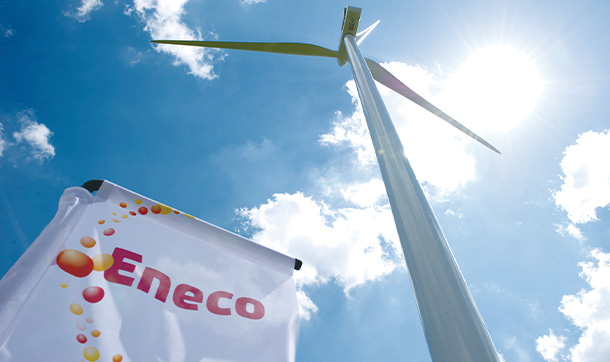
Expanding the Distributed Solar Power Generation Business
- In 2016, MC invested in Nexamp, a business engaged in distributed solar power generation projects in the US, and in 2018, Nexamp became an MC subsidiary.
- Since MC became a shareholder, Nexamp has steadily acquired new assets and has grown to become a leading company in the US community solar industry. Nexamp has over 2 GW of capacity in its total asset portfolio including development pipeline, projects under construction and in operation
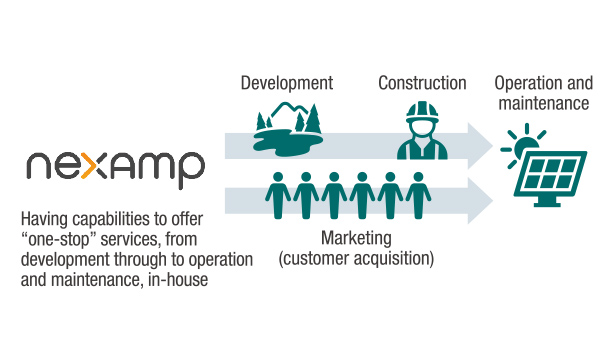
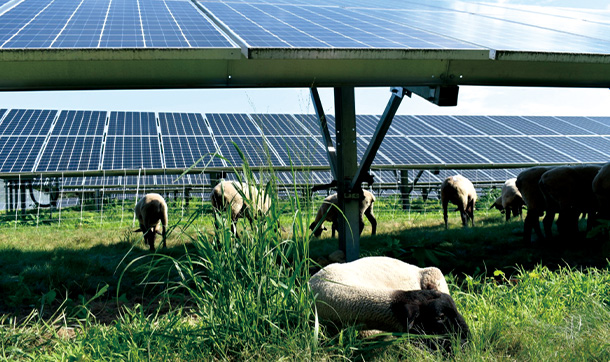
Reduce GHG emissions from existing facilities and projects, including thermal power
MC will strive to reduce GHG emissions at its existing facilities and businesses by divesting from thermal power generation, or alternatively by transitioning them to zero-emission systems that do not emit CO2 during power generation. We will also focus on the early societal adoption of zero-emission thermal power generation by establishing next-generation value chains that include ammonia and hydrogen.
Divestment from Thermal Power Generation
- MC aims to achieve a 100% non-fossil fuel ratio by 2050 in its power generation business by reducing its existing thermal power capacity and switching to zero-emission thermal power.
Policy on Coal-Fired Power Generation
- MC will not enter into any new projects in this area, with the exception of any projects for which orders have already been accepted.
- We plan to complete our exit from coal-fired power generation projects by 2050.
Converting from Coal and Oil to Natural Gas
- We regard natural gas as a vital energy source during the transition to a low-carbon/decarbonized society. To provide the energy required for economic development, particularly in emerging economies in Asia, we will leverage our LNG assets, which have a smaller environmental footprint compared to any other fossil fuel, to fulfill our responsibility to provide a reliable and stable supply of energy.
- MC aims to reduce GHG emissions on a global scale by stimulating demand for LNG in emerging Asian economies, and by leading the transition from coal and oil to natural gas (LNG).
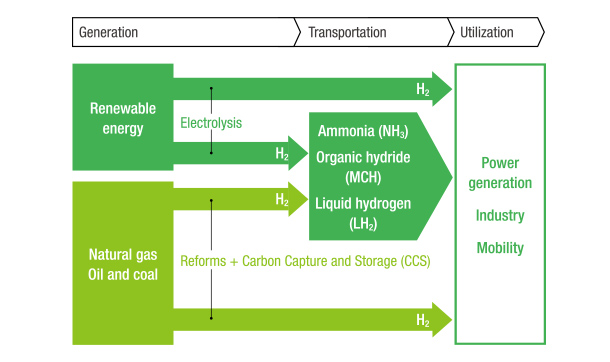
Building Hydrogen and Ammonia Value Chains
1. Production
- MC will explore practical approaches to the production and supply of CO2-free blue ammonia and blue hydrogen through the combination of natural gas and CCUS.
- We will carry out studies with our partners on blue ammonia production, particularly in North America, the Middle East and Southeast Asia.
2. Transport/Utilization (ammonia)
- In collaboration with the Institute of Energy Economics, Japan and Saudi Aramco, MC participated in a supply chain trial run in which blue ammonia produced in Saudi Arabia was successfully transported to Japan.
- We will use our connections with the power industry to implement studies on the use of ammonia co-firing and other technologies.
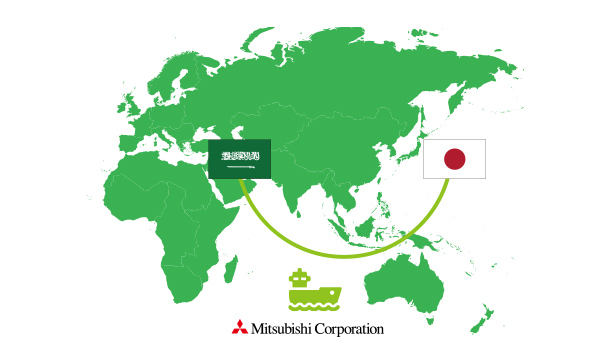
3. Transport (hydrogen)
- The demonstration project for a hydrogen supply chain system based on Chiyoda Corporation's large-scale hydrogen storage and transportation technology (SPERA Hydrogen), which involved the construction of a hydrogenation facility at the Brunei LNG plant, as well as a dehydrogenation plant at a coastal site in Kawasaki City, was successfully completed. We aim to realize a commercial-scale project by the mid-2020s.
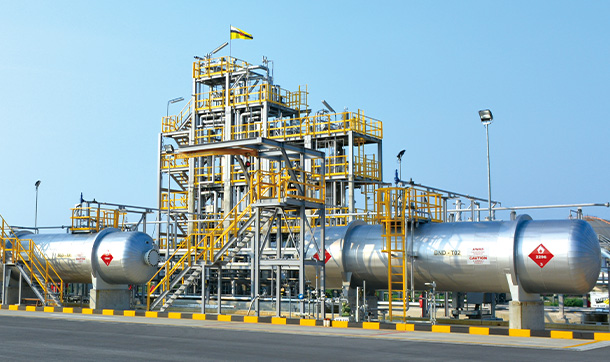
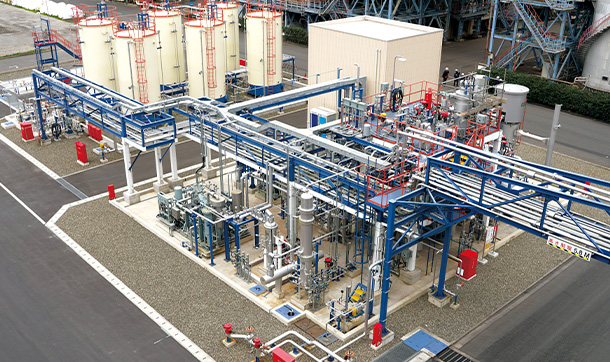
- MC is collaborating with Chiyoda Corporation and five private Singaporean companies on a study regarding the creation of a sustainable hydrogen economy in Singapore
Neutralize remaining GHG emissions
MC will use CCU/CCS and other technologies to neutralize any GHG emissions that remain even after efforts to avoid and reduce emissions.
- We will promote the commercialization of CCUS by establishing a cross-group task force and liaison committee.
CCU
Construction Materials
As a suitable CO2 reduction method is required for each construction material, such as ready-mixed concrete, MC aims for the maximum reduction in CO2 by approaching each product with a combination of various technologies and collaborations with corporations.
- CO2-SUICOM
- Blue PlanetSystems Corporation
- CarbonCure Technologies Inc.
Fuel and Chemicals
With five other companies, MC is working on the research and development of a method to produce para-xylene, which is a material used in clothing and PET bottles, from CO2.
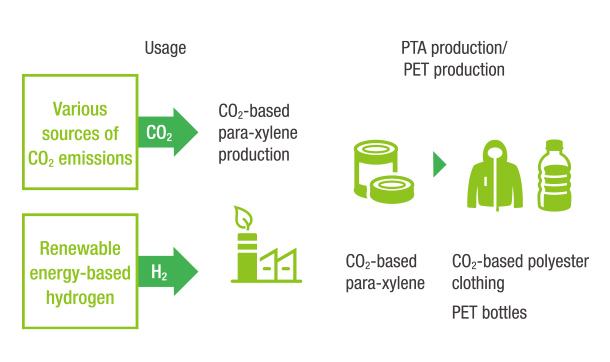
CCS
- In December 2020, MC began exploring possible collaborations with Australian company Santos Limited in the fields of carbon-neutral LNG and CCS.
- We began a joint study on CCS for the production of clean fuel ammonia with PT Panca Amara Utama, an ammonia manufacturer in which MC has an investment.
Carbon Credit Development and Sales
- In May 2021, MC commenced a joint study with South Pole, one of the world's largest carbon credit developers, regarding generating and marketing carbon credits derived from carbon removal technologies such as CCUS.
Past MC Initiatives toward a Low-Carbon/Decarbonized Society
Moves by the international community to mitigate global warming have accelerated since the Paris Agreement entered the implementation phase in 2020. Like Europe, Japan has set a goal of achieving carbon neutrality by 2050.
Even before this global shift, MC has worked to fulfill its responsibility to the global environment and society through business activities based on the spirit of the Three Corporate Principles, which form the basis of its corporate philosophy. The MC Group strives to achieve sustainable growth through the simultaneous generation of economic, societal and environmental value.
We have been involved in the offshore wind power generation business since the early 2010s, when the industry was still in its infancy. These pioneering efforts allowed us to establish a solid foundation in the renewable energy business. MC was the first to import LNG into Japan in 1969, and became an active player in the LNG business in 1972. Since then, we have helped to accelerate progress toward a low-carbon society by expanding our LNG business and ensuring a stable supply of this fuel, which has a lower environmental impact than other fossil fuels. Other areas in which we are contributing to the realization of a low-carbon/decarbonized society include lithium-ion batteries and the battery storage business.
MC will continue to provide a stable supply of energy and work toward the realization of a low-carbon/decarbonized society by actively promoting EX initiatives.

Initiatives Toward a Low-Carbon/Decarbonized Society
Expanding Renewable Energy Generation
MC's involvement in the renewable energy business began with its participation in geothermal and onshore wind power projects in 1987. We play a proactive role in every aspect of these projects, including development, construction, financing and operation. In March 2020, we acquired Eneco as part of the continuing expansion of our renewable energy business.
-
2009-20182009-
2010- Entered the onshore wind power generation business in the US (two projects)
2011- Entered the concentrated solar power (CSP) generation business in Spain
- Entered the offshore power transmission business in the UK
2012- Entered the offshore power transmission business in Germany
- Entered the onshore wind power generation business in France
- Began participating in the onshore wind power business in Mexico
- Entered the solar power generation business in Canada
2013- Entered the offshore wind power generation business in the Netherlands
- Began participating in solar power generation businesses in France and Italy
- Established a collaborative agreement and strategic partnership with Eneco
2016- Began participating in Belgium's largest new offshore wind farm project
- Invested in a US-based distributed solar power generation company
2018- Began participating in a new offshore wind farm project in the UK
-
20202020
- Acquired Eneco, an integrated energy company based in the Netherlands
-
20212021
- Invested in the Monsoon Wind Farm, an onshore wind power generation facility in Laos
Withdrawal of Upstream Crude Oil Assets and Expansion of LNG Business
We have almost completed our withdrawal of the oil and gas exploration and production (E&P) assets that are not linked to our LNG business. Since arranging the first shipment of LNG to Japan over 50 years ago in 1969, MC has contributed to the stable supply of energy by expanding its LNG portfolio, which has a lower impact on the environment than other fossil fuels.
-
2011-20192011
- Made a final investment decision regarding the Donggi-Senoro LNG project in Indonesia, the first all-Asian project of its kind without the participation of resource majors
2016- Made a final investment decision regarding the Tangguh LNG project in Indonesia
2017- Divested a natural gas exploration and development asset in Papua New Guinea, and assets in Gabon (two blocks) (E&P business)
2018- Made a final investment decision regarding the LNG Canada project
- Began participating in an LNG import terminal business in Bangladesh
2019- Divested assets in the Kangean region, Angola and the Kimberley (E&P businesses)
- Commenced commercial production at the Cameron LNG project in the US
Other Activities (Batteries, EVs, Etc.)
MC is using its extensive industrial connections to drive initiatives toward the realization of a low-carbon/decarbonized society in various business areas, including lithium-ion batteries, battery storage, EVs and CCUS projects.
-
2007-20192007
- Expanded into the vehicle lithium-ion battery manufacturing business
- In 2009, started full-scale production of the i-MiEV, the world's first mass-produced EV
2016- Acquired an equity interest in ElectroRoute, an Irish electric power trading company
2017- Launched services based on the Europe's largest battery energy storage system (BESS)
2018- Entered the power retailing and virtual power plant (VPP) business via Lawson stores
- Invested in Boston Energy, an electric power trading company in the US
2019- Established a joint venture to promote the development and adoption of zero-emission electric vessels
- Installed a utility-scale rooftop photovoltaic system and battery energy storage system reusing EV batteries
- Invested in Bboxx, a company specializing in distributed power business in off-grid areas
- Invested in the OVO Group, a UK-based innovative energy service provider
-
20202020
- Expanded into the chemical recycling business (manufacturing business utilizing recycled PET)
- Initiated "Technology Development for Para-xylene Production from CO2" (CCU)
- Commenced R&D on use of CO2 in concrete and CO2-SUICOM (CCU)
- Established a partnership agreement with Blue Planet Systems Corporation (CCU)
- Began collaborating with NTT Anode Energy Corporation in the energy sector
- Commenced collaboration with five private Singaporean companies and Chiyoda Corporation aimed at sustainable importation and commercial utilization of hydrogen in Singapore
-
20212021
- Invested in CarbonCure and formed a business partnership (CCU)
- Signed an MOU concerning a joint study on the use of CCS for the production of clean ammonia fuel in Indonesia
- Commenced collaboration with South Pole to generate and sell carbon credits from carbon removal technologies such as CCUS